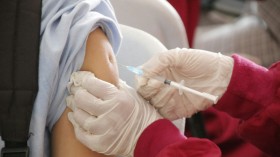When animals feel threatened, their first reaction is usually to freeze or flee. But once their child is involved, everything changes.
A new study conducted by a team of neuroscientists from the Champalimaud Foundation has found that the animal brain releases a "love hormone" called oxytocin when put in a situation where their offspring is in danger.
"Animals have many mechanisms to avoid or defend themselves against deadly encounters with predators," the study reads. "However, adult animals frequently put themselves at risk while protecting their more vulnerable offspring from attacks.... This helps ensure that the parent's genes live on and contribute to the survival of their species."
The study, published in eLife, analyzed how rat mothers reacted when put in a "dangerous" situation. In this case, it was peppermint.
Researchers found rat mothers who were conditioned to fear the smell of peppermint would freeze up in defense when left alone with the scent, but would move to protect their offspring if their young were present. Instead of freezing, the mothers attacked the tube that was emitting the odor.
When researchers blocked oxytocin from reaching the mother's central amygdala, however, she acted as though she were alone, whether her babies were with her or not.
While previous studies have shown that releasing oxytocin into the amygdala causes animals to unfreeze, this team of researchers has discovered why this mechanism exists -- to protect young.
"We put both things together," study leader Marta Moita said in a statement. "We manipulated a circuit where we know precisely how oxytocin leads to inhibition of freezing."
This work provides a new experimental framework "to study the signals transmitted by the pups that make their mother's brain release oxytocin into the amygdala in the face of danger," stimulating the defensive strategy to protect their offspring, Moita added. "We know that chemical communication is very important, but we still haven't identified the sensory stimuli that activate oxytocin."
© 2024 NatureWorldNews.com All rights reserved. Do not reproduce without permission.





